- Home
- Vladimir Nabokov
The Luzhin Defense Page 7
The Luzhin Defense Read online
Page 7
Now, a decade and a half later, these war years turned out to be an exasperating obstacle; they seemed an encroachment upon creative freedom, for in every book describing the gradual development of a given human personality one had somehow to mention the war, and even the hero's dying in his youth could not provide a way out of this situation. There were characters and circumstances surrounding his son's image that unfortunately were conceivable only against the background of the war and which could not have existed without this background. With the revolution it was even worse. The general opinion was that it had influenced the course of every Russian's life; an author could not have his hero go through it without getting scorched, and to dodge it was impossible. This amounted to a genuine violation of the writer's free will. Actually, how could the revolution affect his son? On the long-awaited day in the fall of nineteen hundred and seventeen Valentinov appeared, just as cheerful, loud and magnificently dressed as before, and behind him was a pudgy young man with a rudimentary mustache. There was a moment of sorrow, embarrassment and strange disillusionment. The son hardly spoke and kept glancing askance at the window ("He's afraid there might be some shooting," explained Valentinov in a low voice). All this resembled a bad dream at first--but one gets used to everything. Valentinov continued to assert that whatever was owed him could be settled "among friends" later. It turned out that he had important secret business affairs and money tucked away in all the banks of allied Europe. Young Luzhin began to frequent an eminently quiet chess club that had trustfully blossomed forth at the very height of civil chaos, and in spring, together with Valentinov, he disappeared--once more abroad. After this came recollections that were purely personal, unbidden recollections, of no use to him--starvation, arrest, and so forth, and suddenly--legal exile, blessed expulsion, the clean yellow deck, the Baltic breeze, the discussion with Professor Vasilenko over the immortality of the soul.
Out of all this, out of all this crude mish-mash that stuck to the pen and tumbled out of every corner of his memory, degrading every recollection and blocking the way for free thought, he was unavoidably compelled to extract--carefully and piece by piece--and admit whole to his book--Valentinov. A man of undoubted talent, as he was characterized by those who were about to say something nasty about him; an odd fellow, a Jack-of-all-trades, an indispensable man for the organization of amateur shows, engineer, superb mathematician, chess and checkers enthusiast, and "the amusingest gentleman," in the words of his own recommendation. He had wonderful brown eyes and an extraordinarily attractive laugh. On his index finger he wore a death's head ring and he gave one to understand that there had been duels in his life. At one time he had taught calisthenics in little Luzhin's school, and pupils and teachers alike had been much impressed by the fact that a mysterious lady used to come for him in a limousine. He invented in passing an amazing metallic pavement that was tried in St. Petersburg on the Nevsky, near Kazan Cathedral. He had composed several clever chess problems and was the first exponent of the so-called "Russian" theme. He was twenty-eight the year war was declared and suffered from no illness. The anemic word "deserter" somehow did not suit this cheerful, sturdy, agile man; no other word, however, can be found for it. What he did abroad during the war remained unknown.
And so Luzhin the writer decided to utilize him in full; thanks to his presence any story acquired extraordinary liveliness, a smack of adventure. But the most important part still remained to be invented. Everything he had up to now was the coloration--warm and vivid, on doubt, but floating in separate spots; he had still to find a definite design, a sharp line. For the first time the writer Luzhin had involuntarily begun with the colors.
And the brighter these colors became in his mind the harder it was to sit down at the typewriter. A month went by, another, the summer began, and still he continued to clothe his yet invisible theme in the most festive hues. Sometimes it seemed to him that the book was already written and he clearly saw the set-up type; the galley proof scrolls with red hieroglyphs in the margin, and then the advance copy, so fresh and crisp to the touch; and beyond that was a marvelous mist, delectable rewards for all his failures, for all the fickleness of fame. He visited his numerous acquaintances and lengthily, with great gusto, spoke of his coming book. One emigre newspaper printed a note to the effect that after a long silence he was working on a new tale. And this note, which he himself had written and sent in, he excitedly read over three times and then cut out and placed in his wallet. He began to appear with greater frequency at literary evenings, and he supposed that everyone must be looking at him with curiosity and respect. Once, on a treacherous summer day, he went to a suburban wood, got soaked in a sudden downpour while vainly looking for boletes, and the following day took to his bed. He ailed briefly and lonesomely, and his end was not pacific. The board of the Union of Emigre Writers honored his memory with a minute of silence.
6
"Everything will be spilled, that's certain," said Luzhin, again taking possession of the handbag.
She quickly stretched forth her hand and moved her handbag farther away, banging it down on the table as if thereby to underline the interdiction. "You always have to fiddle with something," she said amicably.
Luzhin looked at his hand, splaying the fingers and then closing them up again. The nails, tawny with nicotine, had ragged cuticles around them; fat little furrows ran across the finger joints, and a few hairs grew lower down. He placed his hand on the table next to her hand, milky-pale and soft to look at, with short, neatly trimmed nails.
"I regret not having known your father," she said after a pause. "He must have been very kind, very earnest and very fond of you."
Luzhin was silent.
"Tell me some more--how was your life here? Were you really a little boy once, running and romping about?"
He replaced both hands on his cane, and from the expression on his face, from the sleepy lowering of his heavy lids and from his slightly open mouth, looking as if he were about to yawn, she concluded that he had grown bored, that he was tired of reminiscing. And anyway, he reminisced coldly; she was puzzled that having lost his father only a month ago, he was now able to look dry-eyed at the hotel where they had lived together during his boyhood. But even in this indifference, in his clumsy words and in the cumbrous stirrings of his soul, that seemed to be drowsily turning over and falling asleep again, she fancied she saw something pathetic, a charm that was difficult to define but one that she had felt in him from the first day of their acquaintance. And how mysterious it was that despite the evident tepidity of his relationship with his father, he had chosen precisely this resort and precisely this hotel, as if expecting to receive from these once-seen objects and landscapes the tingle he was unable to experience without outside assistance. And he had arrived magnificently, on a gray and green day in a drizzling rain, wearing a disgraceful, black, shaggy hat and huge rubbers; and looking through the window at his figure as he clambered ponderously out of the hotel bus, she had felt that this unknown newcomer was someone quite special, unlike any other resident at the resort. That same evening she learned who he was. Everybody in the restaurant looked at this stout, gloomy man who ate greedily and sloppily and sometimes became lost in thought, one finger stroking the tablecloth. She did not play chess, took no interest in chess tournaments, but somehow or other his name was familiar to her, it had unconsciously imprinted itself in her memory, though she was unable to recall when she had first heard it. A German manufacturer who was a long-time sufferer from constipation and liked to talk about it, a man with a one-track mind, but who was good-natured and pleasant and dressed with some taste, suddenly forgot his constipation and, in the gallery where they were drinking the curative water, informed her of several amazing facts about the gloomy gentleman who now, having exchanged his shaggy fedora for an old boater, was standing before a small display window let into one of the columns and examining some handcrafted knickknacks that were being exhibited for sale. "Your fellow countryman," said the manufa
cturer, indicating him with a jerk of the eyebrow, "is a famous chess player. He has come from Paris for the tournament that will be held in Berlin in two months' time. If he wins he'll challenge the world champion. His father recently died. It's all here in the newspaper."
She wanted to make his acquaintance, talk Russian--so attractive did he seem to her with his uncouthness, his gloominess and his low turndown collar which for some reason made him look like a musician--and she was pleased that he did not take any notice of her and seek an excuse to talk to her, as did all the other single men in the hotel. She was not particularly pretty, there was something lacking in her small regular features, as if the last decisive jog that would have made her beautiful--leaving her features the same but endowing them with an ineffable significance--had not been given them by nature. But she was twenty-five, her fashionably bobbed hair was neat and lovely and she had one turn of the head which betrayed a hint of possible harmony, a promise of real beauty that at the last moment remained unfulfilled. She wore extremely simple and extremely well-cut dresses that left her arms and neck bare, as if she were flaunting a little their tender freshness. She was rich--her father had lost a fortune in Russia and made another in Germany. Her mother was due soon at the resort and since the advent of Luzhin the thought of her fussy arrival had become unpleasant.
She made his acquaintance on the third day after his arrival, made it the way they do in old novels or in motion pictures: she drops a handkerchief and he picks it up--with the sole difference that they interchanged roles. Luzhin was walking along a path in front of her and in succession shed: a large checked handkerchief that was unusually dirty and had all sorts of pocket debris sticking to it; then a broken and crushed cigarette minus half of its contents; a nut; and a French franc. She gathered up only the handkerchief and the coin and walked on, slowly catching up with him and curiously awaiting some new loss. With the cane he carried in his right hand, Luzhin touched in passing every tree trunk and every bench, while groping in his pocket with his left, until finally he stopped, turned out his coat pocket, shed another coin, and started to examine the large hole in the lining. "Right through," he said in German, taking the handkerchief from her hand ("This also," she said in Russian). "Poor material," he continued without looking up, neither switching to Russian nor showing any surprise, as if the return of his things had been quite natural. "Oh, don't put them back there," she said with a sudden peal of laughter. Only then did he lift his head and glance morosely at her. His puffy gray face with its badly shaven, razor-nicked cheeks acquired a strange expression of bewilderment. He had wonderful eyes: they were narrow, even slightly slanting, and as if sprinkled with dust under their drooping lids; but through that fluffy dust there showed a moist bluish gleam containing something insane and attractive. "Don't drop them again," she said and walked away, feeling his glance on her back. That evening as she entered the restaurant she could not help smiling at him from afar and he responded with the same gloomy, crooked half-smile he sometimes bestowed on the hotel cat as it slipped noiselessly along the floor from one table to another. And on the following day, in the hotel garden, among the grottoes, fountains and earthenware dwarfs, he went up to her and began in his deep and melancholy voice to thank her for the handkerchief and the coin (and from that time, dimly and almost unconsciously, he constantly watched to see whether she would drop anything--as if trying to reestablish some secret symmetry). "Don't mention it, don't mention it," she replied and added many similiar words--the poor relations of real words--and how many there are of them, these little throw-away words that are spoken hurriedly and temporarily fill the void. Employing such words and feeling their petty vapidity, she asked him if he liked the resort, was he there for long and did he take the waters. He replied that he did, was for long and took the waters. Then, fully aware of the stupidity of the question but incapable of stopping herself, she asked how long he had been playing chess. He gave no answer and turned away and she felt so embarrassed that she began to reel off a list of all the meteorological indications for yesterday, today and tomorrow. He continued silent and she also fell silent, and then she began to rummage in her handbag, searching agonizingly for a topic and finding only a broken comb. Suddenly he turned his face to her and said: "Eighteen years, three months and four days." For her this was an exquisite relief, and furthermore she was somehow flattered by the elaborate circumstantiality of his reply. Subsequently, however, she began to grow a little annoyed that he in his turn never asked any questions, taking her, as it were, for granted.
An artist, a great artist, she frequently thought, contemplating his heavy profile, his corpulent hunched body, the dark lock of hair clinging to his always moist forehead. And perhaps it was precisely because she knew nothing at all about chess that chess for her was not simply a parlor game or a pleasant pastime, but a mysterious art equal to all the recognized arts. She had never been in close contact with such people--there was no one to compare him with except those inspired eccentrics, musicians and poets whose image one knows as clearly and as vaguely as that of a Roman Emperor, an inquisitor or a comedy miser. Her memory contained a modest dimly lit gallery with a sequence of all the people who had in any way caught her fancy. Here were her school reminiscences--the girls' school in St. Petersburg, with an unusual bit of ivy on its frontage that ran along a short, dusty, tramless street, and the geography teacher--who also taught in a boys' school--a large-eyed man with a very white forehead and tousled hair, suffering--they said--from tuberculosis; once a guest--they said--of the Dalai Lama; in love--they said--with one of the upper-form girls, a niece of the white-haired, blue-eyed headmistress, whose tidy little office was so cozy with its blue wallpaper and white Dutch stove. And it was precisely on a blue background, surrounded by blue air, that the geography teacher had remained in her memory: he would dash noisily into the classroom in his usual impulsive manner and then melt away and vanish, yielding his place to another person, who also seemed to her unlike all the rest. The appearance of this person was preceded by lengthy admonitions on the part of the headmistress not to laugh, not on any account to laugh. This was the first year of the Soviet regime; out of forty pupils in the class only seventeen remained, and every day they met the teachers with the question "Will there be lessons today?" and the latter invariably replied: "We still haven't received final instructions." The headmistress ordered there to be no giggles when the man came from the Commissariat for Popular Education, whatever he might say and however he might behave himself. And he came and took up his abode in her memory as an extraordinarily amusing person, a visitor from a different, absurd world. He was lame but very lively and squirmy, with quick, flickering eyes. The girls were crowded in the hushed hall, and he walked back and forth in front of them, limping briskly and turning with simian agility. And as he limped past them, nimbly dragging his foot on its double heel and with his right hand, cutting the air up into regular slices, or else smoothing it out like cloth, he spoke swiftly and at length about the lectures in sociology he would be giving and about an imminent merger with a boys' school--and restrained laughter made one's jaws ache and caused spasms in one's throat. And later in Finland, which had remained in her heart as something more Russian than Russia, perhaps because the wooden villa and the fir trees and the white boat on the lake, black with the reflected conifers, were especially Russian, being treasured as something forbidden on the far side of the frontier. In this Finland which was still vacation land, still part of St. Petersburg life, she saw several times from afar a celebrated writer, a very pale man with a very conspicuous goatee who kept glancing up at the sky, which enemy airplanes had begun to haunt. And he remained in some strange manner beside the Russian officer who subsequently lost an arm in the Crimea during the civil war--a most shy and retiring boy with whom she used to play tennis in summer and ski in winter--and with this snowy recollection there would float up once more against a background of night the celebrated writer's villa, in which he later died, and the cleared
path and snowdrifts illumined by electric light, phantasmal stripes on the dark snow. These men with their various occupations, each of whom tinted her recollection his own particular color (blue geographer, khaki commissar, the writer's black overcoat and a youth all in white lobbing a fir cone with his tennis racket) were followed by glinting and dissolving images: emigre life in Berlin, charity balls, monarchist meetings and lots of identical people--all this was still so close that her memory was unable to focus properly and sort out what was valuable and what rubbish, and moreover there was no time now to sort it out, too much space had been taken up by this taciturn, fabulous, enigmatical man, the most attractive of all the men she had known. His very art and all the manifestations and signs of this art were mysterious. She quickly learned that in the evenings after supper he worked until late at night. But this work was beyond the powers of her imagination, since there was nothing to link it to, neither an easel nor a piano, and it was just such a definite emblem of art that her thoughts reached out for. His room was on the first floor and men with cigars strolling in the darkness of the garden sometimes glimpsed his lamp and his inclined face. Somebody told her finally that he sat at an empty chessboard. She wanted to look for herself and one night, soon after their first conversation, she made her way along the footpath between the oleander bushes to his window. But feeling a sudden awkwardness she went straight by without looking and came out into the avenue, where she could hear music coming from the kursaal, and then, unable to master her curiosity, she went back again to the window, but this time deliberately making the gravel creak so as to convince herself she was not spying. His window was open, the blind unlowered, and in the bright depth of the room she saw him take off his jacket, tense his neck muscles and yawn. And in the slow, massive motion of his shoulder, the image of which continued to heave and turn before her eyes as she hastily walked away in the darkness toward the illuminated terrace of the hotel, she fancied the presence of a mighty fatigue after undivulged but surely miraculous labors.

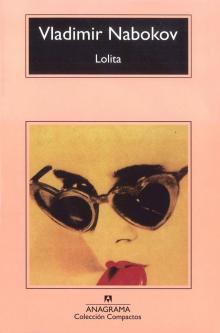 Lolita
Lolita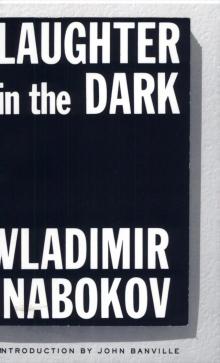 Laughter in the Dark
Laughter in the Dark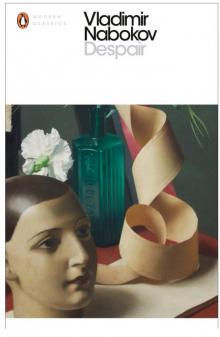 Despair
Despair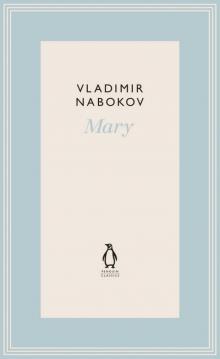 Mary
Mary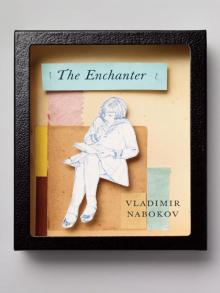 The Enchanter
The Enchanter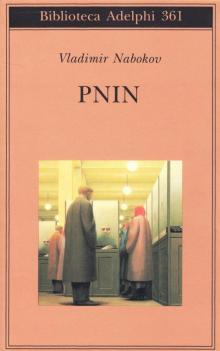 Pnin
Pnin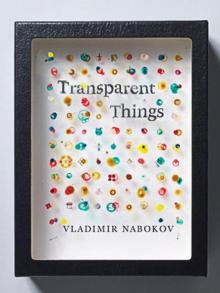 Transparent Things
Transparent Things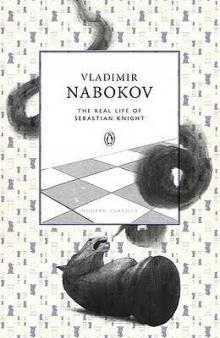 The Real Life of Sebastian Knight
The Real Life of Sebastian Knight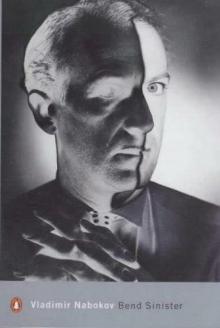 Bend Sinister
Bend Sinister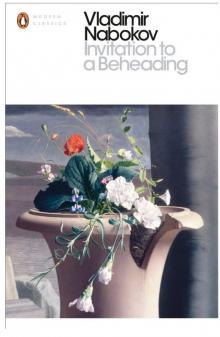 Invitation to a Beheading
Invitation to a Beheading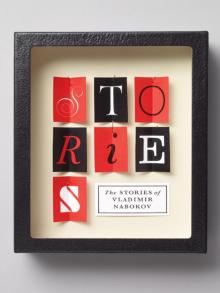 The Stories of Vladimir Nabokov
The Stories of Vladimir Nabokov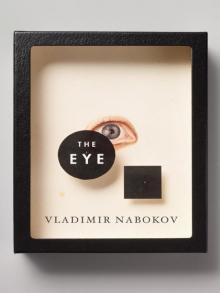 The Eye
The Eye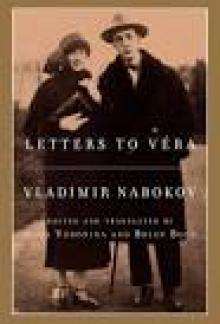 Letters to Véra
Letters to Véra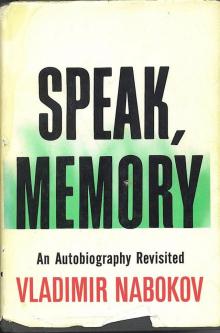 Speak, Memory
Speak, Memory The Gift
The Gift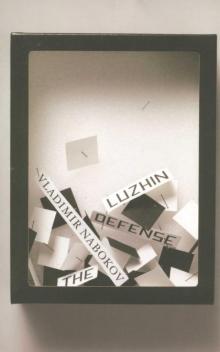 The Luzhin Defense
The Luzhin Defense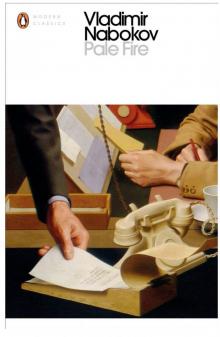 Pale Fire
Pale Fire Glory
Glory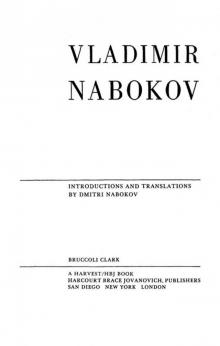 Man From the USSR & Other Plays
Man From the USSR & Other Plays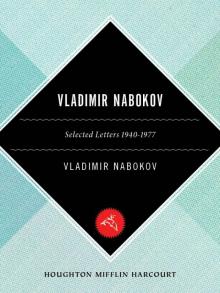 Vladimir Nabokov: Selected Letters 1940-1977
Vladimir Nabokov: Selected Letters 1940-1977 Strong opinions
Strong opinions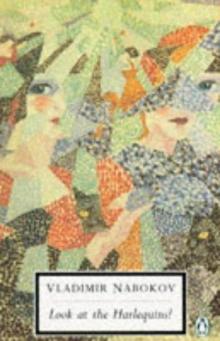 Look at the Harlequins!
Look at the Harlequins!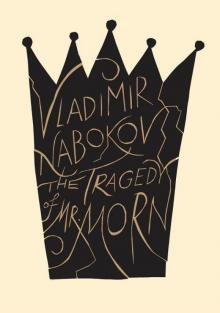 The Tragedy of Mister Morn
The Tragedy of Mister Morn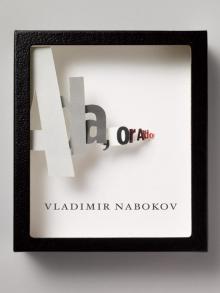 Ada, or Ardor
Ada, or Ardor Lectures on Russian literature
Lectures on Russian literature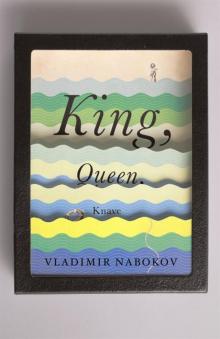 King, Queen, Knave
King, Queen, Knave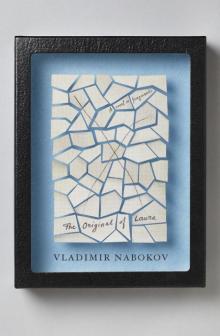 The Original of Laura
The Original of Laura